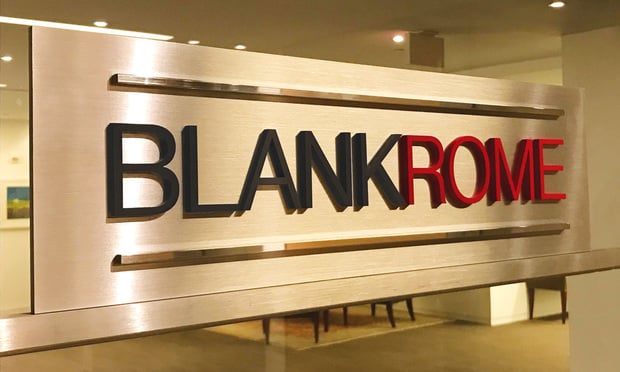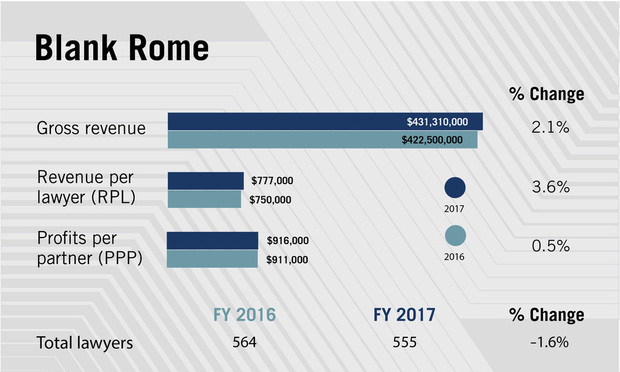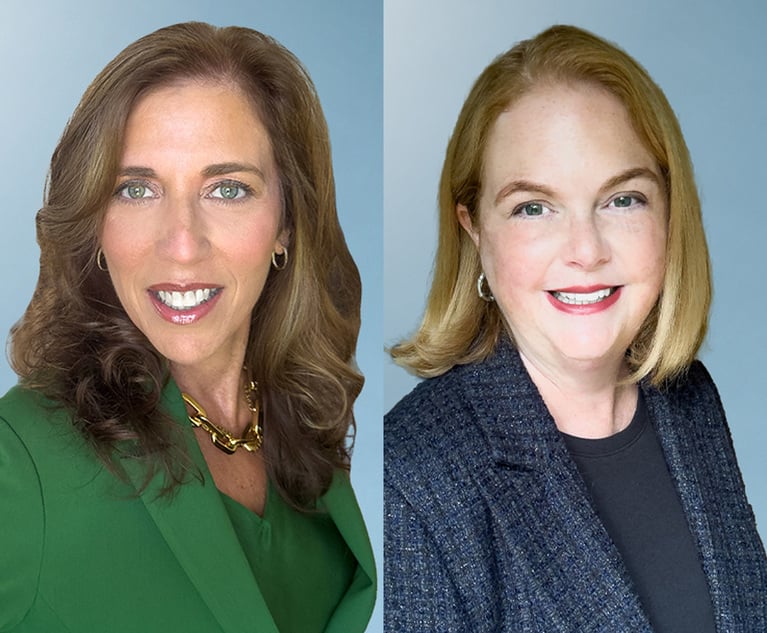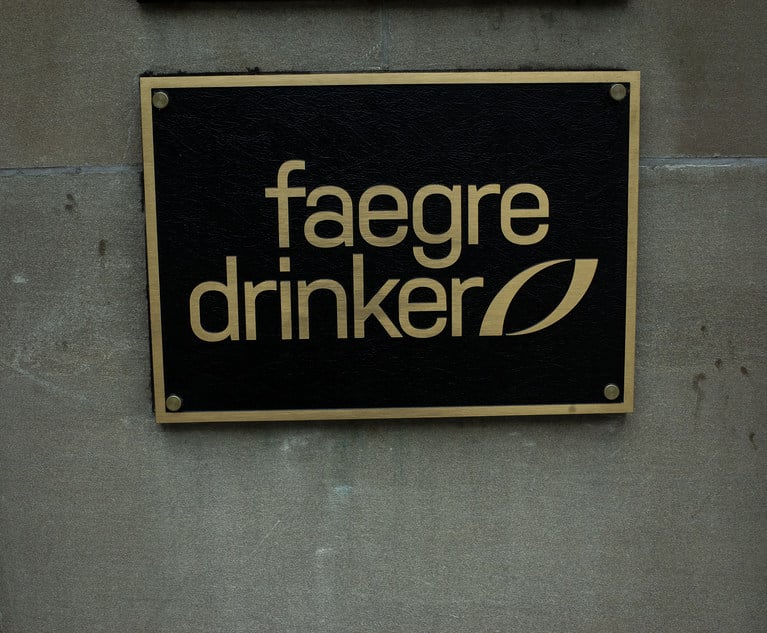Blank Rome Revenue Up 2.1 Percent as Profits Stay Flat
The firm budgeted for an integration year in 2017, chairman Alan Hoffman said.
March 14, 2018 at 11:13 AM
5 minute read
The original version of this story was published on The Legal Intelligencer
 Photo courtesy of Blank Rome.
Photo courtesy of Blank Rome. Blank Rome saw its growth slow in 2017, as leadership said the firm concentrated on integrating newly acquired lawyers rather than boosting revenue and profits by large margins.
Gross revenue increased by 2.1 percent, to $431.3 million, while revenue per lawyer was up 3.6 percent, to $777,000.
Profits per equity partner were nearly flat, increasing by 0.5 percent from 2016 to 2017, to $916,000.
Blank Rome's chairman, Alan Hoffman, pointed to the firm's longer-term growth trajectory, including a 25 percent increase in gross revenue since 2015. That included a major boost in 2016, when Blank Rome brought on more than 100 lawyers from now-shuttered Dickstein Shapiro.
The aftermath of that growth is something the firm budgeted for in 2017, Hoffman said.
 “Integration was extremely important to the 2017 year,” he said. “We had opportunities in 2017 to acquire some other law firms or do a merger that we walked away from because we wanted to make sure we integrated all the growth we had done in 2015 and 2016.”
“Integration was extremely important to the 2017 year,” he said. “We had opportunities in 2017 to acquire some other law firms or do a merger that we walked away from because we wanted to make sure we integrated all the growth we had done in 2015 and 2016.”
And while PPP grew very slightly, Hoffman said he was pleased with the figure given a 4.4 percent increase in equity partners last year, to 145. The firm saw a 4.1 percent increase in total partners.
While the partnership grew, the firm's total head count decreased by 1.6 percent, to 555 lawyers. That nudged down the firm's leverage from 3.06 to 2.82 lawyers per equity partner.
Litigation Rebound
Hoffman said the firm's financial services, real estate, commercial litigation and maritime and international trade practices were strongest in 2017. Commercial litigation, he said, had “a real bounce back” following an industrywide lag.
Grant Palmer, Blank Rome's litigation department chairman and its incoming managing partner, noted several highlights from 2017 in commercial litigation. They included the firm's representation of Johnson & Johnson in talc litigation and its work for Phillies co-owner John Middleton in a family dispute that settled early this year.
“Developments like that on big cases that have really driven hours to improve,” Palmer said. “A lot of that is the result of years of efforts … getting into a position to get better and bigger work.”
Hoffman also noted the firm's victory on behalf of TGI Fridays in New Jersey Supreme Court, where one case against the restaurant chain over drink prices was denied class certification, and another was limited by the court.
Growth Plans
The firm turned down some opportunities to expand in 2017 but continued to make lateral hires in certain areas, Hoffman said.
In Philadelphia, Blank Rome hired a three-lawyer benefits group from Pepper Hamilton in February. Also early in the year, the firm brought on a family office partner from Pepper Hamilton and two energy partners from Norton Rose Fulbright in Pittsburgh, as well as a restructuring and bankruptcy partner in Washington, D.C., from Cadwalader, Wickersham & Taft.
Later in the year, Blank Rome made one more Philadelphia hire, adding white-collar lawyer Mark Lee from Schnader Harrison Segal & Lewis, where he had chaired that practice. In October the Los Angeles office brought on three lawyers from Kasowitz Benson Torres with a policyholder-dedicated practice, adding to the insurance recovery practice Blank Rome had rebranded after the Dickstein Shapiro deal.
The firm raised rates by between 3 percent and 5 percent in 2017, Hoffman said. And it looked to control expenses, keeping expense growth under 1 percent, he said. The firm also prepaid 2018 expenses, Hoffman said.
Palmer said Blank Rome has been focused on pricing initiatives, working toward giving clients clearer expectations. The firm has separate pricing teams for its corporate and litigation practices.
“When you give clients an idea of pricing and how that's going to play out, it really is a win-win for Blank Rome and for the client,” Palmer said, noting that the legal industry is just beginning to embrace pricing as an important firm function. “It's not something you can do overnight. We're working very hard to be a market leader in that area,” he said.
Palmer said he wants to bring those pricing initiatives to a place where they're creating profitability for the firm.
Efficiency for clients is a major focus for the industry as a whole right now, Hoffman said. Sometimes that means using alternative fee arrangements and fixed pricing, he said, but it also involves partnering with clients and collaborating between practice areas.
Increasing the firm's diversity is also a major focus for the future, Palmer said. The firm in 2017 signed onto Diversity Lab's “Mansfield Rule” pilot program, agreeing to consider women and minorities as at least 30 percent of the leadership pool when selecting lawyers for leadership roles.
In 2018, Blank Rome plans to continue growing, Hoffman said. And it's restarting the conversation with firms that it passed on for mergers last year. Those combination opportunities involve firms of less than 100 lawyers, he said, with no “merger of equals” on the table.
This content has been archived. It is available through our partners, LexisNexis® and Bloomberg Law.
To view this content, please continue to their sites.
Not a Lexis Subscriber?
Subscribe Now
Not a Bloomberg Law Subscriber?
Subscribe Now
NOT FOR REPRINT
© 2025 ALM Global, LLC, All Rights Reserved. Request academic re-use from www.copyright.com. All other uses, submit a request to [email protected]. For more information visit Asset & Logo Licensing.
You Might Like
View All
Faegre Drinker Adds Three Former Federal Prosecutors From Greenberg Traurig
4 minute read
Ex-Holland & Knight Attorney Improperly Accessed Client File to Gain Upper Hand in Divorce Proceedings, Suit Alleges
5 minute read

Trending Stories
- 1Pro Hac Vice in Georgia: Rule Change for Nonresident Attorneys
- 2The Benefits of E-Filing for Affordable, Effortless and Equal Access to Justice
- 3AI and Social Media Fakes: Are You Protecting Your Brand?
- 4A Primer on Using Third-Party Depositions To Prove Your Case at Trial
- 5‘Catholic Charities v. Wisconsin Labor and Industry Review Commission’: Another Consequence of 'Hobby Lobby'?
Who Got The Work
J. Brugh Lower of Gibbons has entered an appearance for industrial equipment supplier Devco Corporation in a pending trademark infringement lawsuit. The suit, accusing the defendant of selling knock-off Graco products, was filed Dec. 18 in New Jersey District Court by Rivkin Radler on behalf of Graco Inc. and Graco Minnesota. The case, assigned to U.S. District Judge Zahid N. Quraishi, is 3:24-cv-11294, Graco Inc. et al v. Devco Corporation.
Who Got The Work
Rebecca Maller-Stein and Kent A. Yalowitz of Arnold & Porter Kaye Scholer have entered their appearances for Hanaco Venture Capital and its executives, Lior Prosor and David Frankel, in a pending securities lawsuit. The action, filed on Dec. 24 in New York Southern District Court by Zell, Aron & Co. on behalf of Goldeneye Advisors, accuses the defendants of negligently and fraudulently managing the plaintiff's $1 million investment. The case, assigned to U.S. District Judge Vernon S. Broderick, is 1:24-cv-09918, Goldeneye Advisors, LLC v. Hanaco Venture Capital, Ltd. et al.
Who Got The Work
Attorneys from A&O Shearman has stepped in as defense counsel for Toronto-Dominion Bank and other defendants in a pending securities class action. The suit, filed Dec. 11 in New York Southern District Court by Bleichmar Fonti & Auld, accuses the defendants of concealing the bank's 'pervasive' deficiencies in regards to its compliance with the Bank Secrecy Act and the quality of its anti-money laundering controls. The case, assigned to U.S. District Judge Arun Subramanian, is 1:24-cv-09445, Gonzalez v. The Toronto-Dominion Bank et al.
Who Got The Work
Crown Castle International, a Pennsylvania company providing shared communications infrastructure, has turned to Luke D. Wolf of Gordon Rees Scully Mansukhani to fend off a pending breach-of-contract lawsuit. The court action, filed Nov. 25 in Michigan Eastern District Court by Hooper Hathaway PC on behalf of The Town Residences LLC, accuses Crown Castle of failing to transfer approximately $30,000 in utility payments from T-Mobile in breach of a roof-top lease and assignment agreement. The case, assigned to U.S. District Judge Susan K. Declercq, is 2:24-cv-13131, The Town Residences LLC v. T-Mobile US, Inc. et al.
Who Got The Work
Wilfred P. Coronato and Daniel M. Schwartz of McCarter & English have stepped in as defense counsel to Electrolux Home Products Inc. in a pending product liability lawsuit. The court action, filed Nov. 26 in New York Eastern District Court by Poulos Lopiccolo PC and Nagel Rice LLP on behalf of David Stern, alleges that the defendant's refrigerators’ drawers and shelving repeatedly break and fall apart within months after purchase. The case, assigned to U.S. District Judge Joan M. Azrack, is 2:24-cv-08204, Stern v. Electrolux Home Products, Inc.
Featured Firms
Law Offices of Gary Martin Hays & Associates, P.C.
(470) 294-1674
Law Offices of Mark E. Salomone
(857) 444-6468
Smith & Hassler
(713) 739-1250










